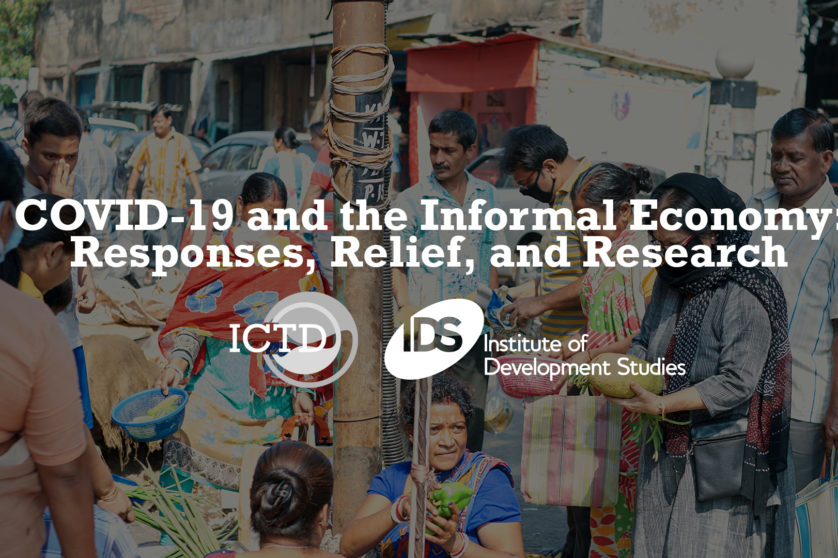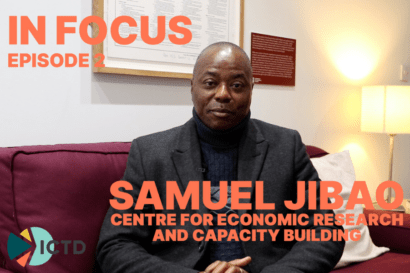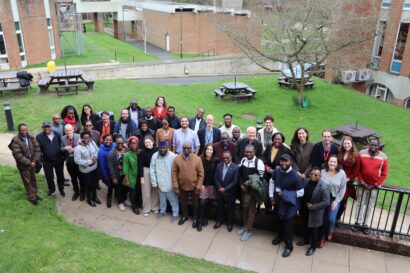On April 16th, ICTD Research Fellows Max Gallien and Vanessa van den Boogaard hosted a virtual roundtable on Covid-19 and the informal economy. The event was attended by over 200 participants from around the world via Zoom and YouTube. Participants included researchers, academics, policymakers, and representatives of civil society and advocacy organisations.
Max and Vanessa opened the discussion by introducing three key topics:
- The effects of COVID-19 and containment measures on the informal economy: Workers in informal economies across the globe have been particularly vulnerable to the virus, while also being made more vulnerable financially. While the virus itself may not discriminate, inequities embedded in social, economic, and political structures mean that the impact of both the virus and containment measures are significantly worse for vulnerable populations.
- The impact and reach of relief efforts: Many relief efforts—including tax reliefs and wage subsidies—bypass individuals and businesses in the informal sector. While direct cash transfers may better reach the informal economy, they come with enormous implementation challenges. In the long run, informal economies may bear the brunt of financing these relief efforts, as governments may seek to “broaden the tax base” through “formalisation” strategies—rather than focusing on, for example, taxing the wealthy—in the post-crisis period.
- The role of research in supporting policy responses during the crisis and in the post-crisis period: Data is urgently needed to more equitably target policy responses. However, there are particular challenges of safely collecting data during the pandemic, while remote data collection strategies may introduce biases and reinforce inequities. For example, unequal mobile phone ownership and internet access limits the reach and inclusivity of commonly used remote data collection techniques. At the same time, reaching informal sector workers is not straightforward. Researchers may consider working with local organisations, including informal labour unions, to reach individuals, households, and businesses that may be “invisible” through the lens of government registries. At the same time, researchers should consider how to make data more accessible, timely, and relevant for policymakers, advocacy organisations, and community stakeholders.
Four esteemed panellists deepened the discussion:
Kate Meagher (Associate Professor, London School of Economics) drew on WIEGO’s framework highlighting visibility, validity, and voice to draw attention to what we are not seeing in the crisis and crisis responses. For instance, while informal workers have become more politically visible during the pandemic, attention has largely focused on the risks posed to “mainstream” society, rather than the needs of informal workers. She drew attention to the contradictions inherent in crisis responses that fail to address sustainable financing for social welfare systems in the long run, while emphasising that the key issue of labour rights has been insufficiently discussed in relation to emergency relief measures.
Rachel Moussié (Deputy Director, Social Protection Programme, WIEGO) summarised WIEGO’s work in conducting a rapid appraisal of the situation of informal workers. She presented data from this assessment, which was conducted from March 23rd to April 8th across Asia, Africa, Latin America, and Eastern Europe. She highlighted that the effects of the pandemic on the informal sector were felt before the arrival of the virus and containment measures in different contexts, that these effects have been gendered, and that some outcomes—including loss of income and spaces for informal sector workers—will be permanent.
Umair Javed (Assistant Professor, Lahore University of Management Sciences) presented research on the context of the informal sector in Pakistan. He highlighted worsening vulnerability for informal sector workers, including through income and infrastructure effects, while emphasising biases embedded in policy responses. For instance, while there have been cash transfers in the Pakistani context, there is a question of who is targeted by these payments, relating to deeper questions about power dynamics, voice, and inclusion.
Gerard McCarthy (Postdoctoral fellow, National University of Singapore) provided information on the context in Myanmar, explaining the limited nature of policy responses for the informal sector. He highlighted in particular how there has been and will continue to be a shifting burden of social welfare provision from the state onto non-state actors, financed through charity and informal taxation. He also provided insights into how researchers may approach data collection during the pandemic, describing useful techniques for conducting mobile phone and internet-based research.
Two discussants provided further useful insights. Kristof Titeca (Senior Lecturer, University of Antwerp) described how COVID-19 and research on the virus may serve as a magnifying glass for issues in the informal economy more broadly, while emphasizing the risks of reinforcing power dynamics, inequities, and exclusion through remote data collection. Philip Mader (Research Fellow, IDS) added a useful perspective in thinking about the implications of increasing debt burdens from a micro- and macro-perspective, and highlighted the dangers of common misconceptions on the role of paper money in the spread of the virus.
Overall, the seminar sparked a useful discussion about how the pandemic and responses to it will affect vulnerable populations in the short- and long-term. Audience questions prompted discussions on the different levels of government that can most effectively be engaged in emergency responses, how to deal with the increasing stigmatisation of informal workers as ‘vectors of disease’, and how to mobilise and distribute relief efforts. Across diverse contexts and in high- and low-income countries, informal social welfare systems and informal revenue generation are filling gaps left by the state.
Without a more focused policy discussion of how to more equitably finance sustainable social welfare—including through wealth and other progressive taxes—the global pandemic and its fallout will reinforce inequality and the uneven power dynamics in the fiscal relationship between the state and the informal sector. Multiple panellists highlighted the continuing importance of the central state as a key focal point in this context, as fiscal and political relationships between states and informal economies will continue to shift in the aftermath of the crisis. Panellists highlighted the importance of research to understand these processes and engage critically with policy development, and looked forward to continuing these conversations.
Watch the full discussion:
Recent ICTD blogs further elaborate on the impacts of COVID-19 on the informal economy and the potential impacts for informal revenue generation.
The ICTD has an open call for proposals for research on informality, tax, and the state. Learn more here.
We were also asked by participants how they could support informal workers during the crisis. Please see a list of fundraising appeals for informal workers organisations circulated by WIEGO here.



